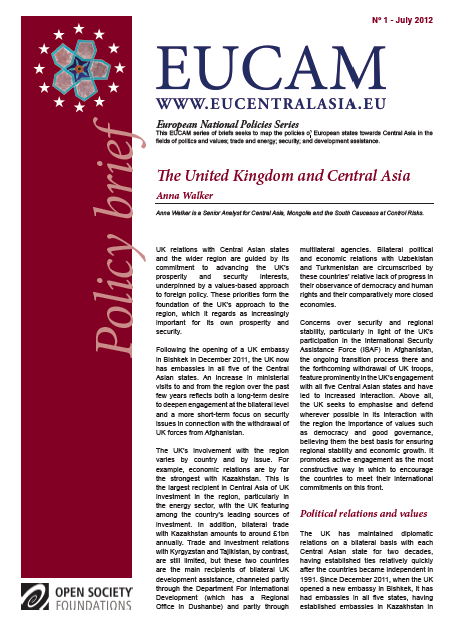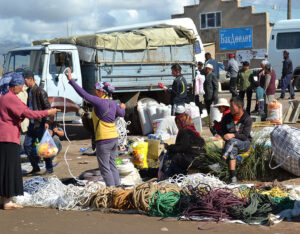European National Policies Series – the UK and Central Asia

UK relations with Central Asian states and the wider region are guided by its commitment to advancing the UK’s prosperity and security interests, underpinned by a values-based approach to foreign policy. These priorities form the foundation of the UK’s approach to the region, which it regards as increasingly important for its own prosperity and security.
Following the opening of a UK embassy in Bishkek in December 2011, the UK now has embassies in all five of the Central Asian states. An increase in ministerial visits to and from the region over the past few years reflects both a long-term desire to deepen engagement at the bilateral level and a more short-term focus on security issues in connection with the withdrawal of UK forces from Afghanistan.
The UK’s involvement with the region varies by country and by issue. For example, economic relations are by far the strongest with Kazakhstan. This is the largest recipient in Central Asia of UK investment in the region, particularly in the energy sector, with the UK featuring among the country’s leading sources of investment. In addition, bilateral trade with Kazakhstan amounts to around £1bn annually. Trade and investment relations with Kyrgyzstan and Tajikistan, by contrast, are still limited, but these two countries are the main recipients of bilateral UK development assistance, channeled partly through the Department For International Development (which has a Regional Office in Dushanbe) and partly through multilateral agencies. Bilateral political and economic relations with Uzbekistan and Turkmenistan are circumscribed by these countries’ relative lack of progress in their observance of democracy and human rights and their comparatively more closed economies.
Concerns over security and regional stability, particularly in light of the UK’s participation in the International Security Assistance Force (ISAF) in Afghanistan, the ongoing transition process there and the forthcoming withdrawal of UK troops, feature prominently in the UK’s engagement with all five Central Asian states and have led to increased interaction. Above all, the UK seeks to emphasise and defend wherever possible in its interaction with the region the importance of values such as democracy and good governance, believing them the best basis for ensuring regional stability and economic growth. It promotes active engagement as the most constructive way in which to encourage the countries to meet their international commitments on this front.
Political relations and values
The UK has maintained diplomatic relations on a bilateral basis with each Central Asian state for two decades, having established ties relatively quickly after the countries became independent in 1991. Since December 2011, when the UK opened a new embassy in Bishkek, it has had embassies in all five states, having established embassies in Kazakhstan in 1992, Uzbekistan in 1993, Turkmenistan in 1995 and Tajikistan in 2001. The UK also maintains ties with the states through the various EU institutions involved in the region, mainly through the EU-Central Asia Strategy, adopted in 2007.
Its commitment to engaging with these structures and initiatives is consistent with its broader view that an effective EU policy, regardless of the nationality of the officials in charge of implementing that policy, serves the UK’s national interests.
In line with its values-based approach to foreign policy, the UK attaches considerable importance to values such as democracy, human rights, good governance and rule of law in Central Asia. It believes that shortfalls in these areas have a direct impact on regional stability and growth, which in turn are crucial both to the UK’s own prosperity and security. The UK promotes these values pro-actively on a bilateral basis, for example through political engagement with regional governments and through programmes with local non-governmental organisations (NGOs) and civil society, where this is possible. It also promotes them through EU mechanisms and through programmes implemented by international organisations such as the Organisation for Security and Co-operation in Europe (OSCE) and the World Bank. At the same time it acknowledges that several of the states in Central Asia are a long way from meeting their commitments to international bodies on areas such as democracy and human rights, but regards engagement with governments and civil society across the region as the most effective way to address these concerns.
UK officials have held bilateral meetings with their Central Asian counterparts both in the UK and during ministerial and other official visits to the five countries, and the level of attention towards the region is increasing, albeit from a very low base. The purpose of several of these meetings has been to secure support and access routes for the forthcoming withdrawal of UK forces from Afghanistan. For example, most recently, the Secretary of State for Defence met President Nursultan Nazarbayev and the Minister of Defence in Kazakhstan in February 2012; the Minister of State for Energy and Climate Change visited Kazakhstan in September 2011, where he held talks with the Deputy Prime Minister. The Foreign Minister of Kazakhstan visited the UK in August 2011, when he met his UK counterpart. The UK Defence Secretary also visited Uzbekistan in February 2012, while the most recent ministerial visit to the UK from Uzbekistan was that of the Deputy Prime Minister in 2009, when he held meetings with the Minister of Europe. The President of Uzbekistan also made a short stopover in the UK in September 2010, when he met the chair of the All-Party Parliamentary Group on Central Asia and the co-chair of the Uzbek-British Trade and Industry Council.
The Minister of State for the Armed Forces visited Turkmenistan in March 2012, when he met the President. Earlier, in November 2011, the Deputy Chief of the Defence Staff met the Deputy Prime Minister and Foreign Minister during a visit to Turkmenistan. Afghanistan and, more broadly, regional stability were the focus of these discussions. Turkmenistan’s Deputy Prime Minister led a delegation to the UK for the second meeting of the Turkmenistan-UK Trade and Investment Council (TUKTIC) in January 2012. During his visit he met the Minister for Europe and, during a reception at the Foreign and Commonwealth Office, His Royal Highness the Duke of York. Talks focused on economic and business opportunities for UK companies.
The Minister for International Development made the first UK ministerial visit to Tajikistan in October 2011, where he met the President; he also visited Kyrgyzstan in the same month. In February 2010 the foreign ministers of Tajikistan and Kyrgyzstan attended the London Conference on Afghanistan.
Trade and energy
UK trade with Central Asia has grown strongly in recent years, more than doubling in 2011 to over £1.1bn. Within overall trade patterns with Central Asia, the UK’s trade interests vary by country, with exports ranging from machinery and equipment and financial services to those related to the knowledge-based economy. Trade links are by far the most extensive with Ka- zakhstan, with which bilateral trade is growing rapidly. UK ex- ports to Kazakhstan were worth £530m in 2011, up by 124 per- cent compared with 2010. UK imports from Kazakhstan were
£459m, also up by 124 percent. Among other items, the UK exports machinery and equipment for the oil and gas, mining, power generation and manufacturing sectors to Kazakhstan. The main imports from Kazakhstan are mineral resources, in- cluding copper and crude oil.
UK trade with the other four countries in Central Asia is much smaller. Overall trade with Uzbekistan amounted to £93m in 2010, of which exports amounted to £55m and imports £38m. Bilateral trade with Turkmenistan is at a similar level, with ex- ports of £59.5m in 2011 and imports of £21.3m. Trade flows with Kyrgyzstan and Tajikistan are very small.
The UK is one of the largest foreign investors in Kazakhstan, particularly in the latter’s energy sector, and regularly features among the leading two or three country sources of investment into Kazakhstan. Among the main investors in the energy sec- tor are oil and gas companies BG Group and Shell; engineer- ing consultancy AMEC and technology company Invensys have a strong presence in the contracting sector. In addition, more than 100 smaller services companies are active in Kazakhstan, particularly in the oil and gas sector. The UK is also well repre- sented in the financial and business services sector, and has strong links with Kazakhstan’s education sector, including in technical/vocational education, university education and sec- ondary schooling. For example, a number of universities run programmes at the Kazakh-British Technical University, where BG Group and Shell have also provided funding for post-grad- uate programmes.
The UK is also represented in the education sector in Uzbeki- stan, where, for example, Westminster University has opened a British-Uzbek university. The extractives/natural resources sector (Oxus Resources) and tobacco industry (BAT) are the other main destinations for UK investment in Uzbekistan, and professional services companies also have a presence there. UK companies have only a limited presence in the other Cen- tral Asian countries.
Few Central Asian companies are active in the UK, although several leading entities from Kazakhstan, for example copper company Kazakhmys and natural resources group ENRC, have listed on the London Stock Exchange. Initial public offerings (IPOs) by companies from Kazakhstan since 2005 amount to more than £14bn.
The UK has described the diversification of energy supplies to the EU as a priority towards which it is working on both a bilateral basis and with the EU. As part of this, it supports the concept of the so-called Southern Corridor that would bring en- ergy from the Caspian region to Europe, via Turkey. However, at the same time the UK believes that the choice of a particular pipeline or project, be that Nabucco or the proposed trans-Cas- pian pipeline, is a commercial decision that should be made by private-sector companies.
Security
The UK regards the Central Asian region as increasingly important to its national security interests, mindful of the impact on its own security that instability even in a geographically- distant region can have. The security threats to the UK emanating from Afghanistan, such as religious extremism and the illegal drugs trade, illustrate this well.
For this reason, the UK considers that it shares with Central Asia an interest in securing regional stability, part of which depends on achieving a stable transition in Afghanistan and a secure future for that country. To this end, the UK has expressed its support for Central Asian involvement in infrastructure projects in Afghanistan as an important means of bringing stability and security to the latter, and has urged the Central Asian states to continue to engage with Afghanistan in this way.
Furthermore, the UK has actively sought the support of the Central Asian states for the International Security Assistance Force (ISAF) in Afghanistan, and to this end has stepped up its engagement with the region at ministerial level. In February 2012, for example, the Secretary of State for Defence, Philip Hammond, held talks with the governments of Kazakhstan and Uzbekistan to secure access to routes through these countries to enable the return of equipment from Afghanistan to the UK, on the completion of combat operations in Afghanistan in 2014. During the visit Mr Hammond signed an agreement with Kazakhstan securing overflight access, and the two sides also agreed to hold talks relating to a land transit agreement. He held similar talks with Uzbekistan. Shortly afterwards the Armed Forces Minister visited Kyrgyzstan, Tajikistan and Uzbekistan to discuss these questions further.
For the most part, the UK engages in both hard and soft security issues with Central Asia indirectly, through institutions such as the EU and the Organisation for Security and Co-operation in Europe (OSCE), in particular, as well as under the auspices of NATO. For example, UK troops participate each year in annual military exercises in Kazakhstan (‘Steppe Eagle’), which are aimed at improving the inter-operability of Kazakhstan’s armed forces with NATO. In addition, the UK Ministry of Defence offers places on training courses for officers from the Central Asian states, including at the Royal College of Defence Studies, as well as language training. The UK also conducts security- sector reform projects, helping to fund border management programmes (for example, the Tajik-Afghan border), including through the EU and the UN Office on Drugs and Crime.
Overall, the UK believes that for more effective promotion of regional security and stability, both it and the broader international community should engage more effectively in a range of security areas. These include support for counter- narcotics programmes; measures to strengthen border security; programmes dedicated to conflict prevention and crisis management; counter-radicalisation programmes; and defence reform.
Development assistance
The UK provides development assistance to Central Asia mainly through the Department For International Development (DFID), which plans to spend an average of £14m per year in the region until 2015, under its Operational Plan for 2011-
15. The plan is revised annually, but assistance is directed mainly to programmes supporting wealth creation, democracy and stability, primarily through programmes in Kyrgyzstan and Tajikistan, the two poorest countries in the region. DFID has a Regional Office in Dushanbe, while the British embassy in Bishkek has a Development Section that works with the Regional Office. DFID works in the region principally either with or through other donor partners. As well as the support provided by DFID, individual UK embassies in the region also provide development assistance for small-scale projects. The UK does not provide bilateral development assistance to Kazakhstan, Turkmenistan or Uzbekistan, but maintains links with multilateral aid agencies that operate there.
DFID support to Kyrgyzstan and Tajikistan focuses on poverty reduction through the promotion of sustainable economic growth and good governance. Its projects in Kyrgyzstan are delivered in the form of technical assistance, programme-based support and a health-sector budget support programme. It also aims to promote regional development. In Tajikistan DFID focuses on strengthening governance (particularly through programmes to improve financial management in the public sector); supporting economic growth (for example, through reforming the business environment and improving access to credit for entrepreneurs); improving the effectiveness of aid delivery; and addressing climate change. In addition, a Rural Growth Programme supports rural development in the northern Sughd region. DFID also contributes to a region-wide World Bank programme aimed at preventing HIV/AIDS among intravenous drug-users and sex workers.
As well as providing bilateral development assistance, the UK also supports assistance programmes offered by multilateral institutions, including the international financial institutions and international bodies such as the UNDP. The Rural Growth Programme in Tajikistan, for example is administered in conjunction with the UNDP and Germany’s GIZ. More generally, DFID programmes are for the most part carried out in conjunction with other donor partners, with the aim of ensuring a more coherent approach to development programmes and reducing duplication of efforts.
Conclusion
The growing number of senior-level ministerial visits to Central Asia testifies to the increasing importance that the UK attaches to its ties with the region and to its recognition of the impact that developments in the countries can have on the UK’s prosperity and national security interests.
Trade with the region is developing rapidly, with overall trade flows between the UK and Central Asia doubling between 2010 and 2011 to more than £1.1bn. Although trade and investment relations are most extensive with Kazakhstan, and in particular with that country’s energy sector, the UK will continue to pursue stronger economic ties with the other countries in the region. The opening of the new embassy in Bishkek testifies to the importance that the UK attaches to this. It also demonstrates the UK’s broader interest in and commitment towards securing and reinforcing regional stability, particularly in light of the planned end of combat operations in neighbouring Afghanistan in 2014. It believes that the countries of Central Asia have an important role to play to this end, both through their support for ISAF and through their own, regional contributions to Afghanistan’s economic development. The UK will also continue to advocate and encourage stronger engagement with Central Asia on addressing regional security threats such as the illegal narcotics trade and radicalisation.
UK development assistance to Central Asia will continue to focus on fostering sustainable economic growth, with a view to reducing poverty, particularly in the two poorest countries, Kyrgyzstan and Tajikistan. Throughout its political, trade, security and development engagement with the region, the UK will continue to promote a values-based approach, judging that progress in the countries’ observance of the rule of law, good governance, democracy and human rights provides the best foundation for regional stability. At the same time, it is realistic in its expectations over what can be achieved, given the scale of the challenge and the UK’s relatively weaker voice in these areas compared with some actors in the region. For that reason, it regards its progress towards embedding these values as a long-term undertaking.
Download “European National Policies Series - the UK and Central Asia” EUCAM-National-Policies-Brief-1.pdf – Downloaded 394 times – 1.20 MB


![shutterstock_1240181551 [Omgezet]](https://eucentralasia.eu/wp-content/uploads/2024/10/shutterstock_1240181551-Omgezet-300x248.jpg)



